
Digging in his heels, Libyan dictator Muammar Gaddafi on Wednesday refused to give up power and claimed that the anti-regime protests were part of a conspiracy to grab the oil resources of the country.
As his forces went on an offensive to wrest key cities from the rebels, 68-year-old Gaddafi appeared at a public gathering for the first time, an event aired live on state television.
"We will fight to the end, to the last man, the last woman, with God's help," he said while describing the two-week long protests as being orchestrated by only a minority who were being propped up by "foreign forces, foreign media".
"Millions of Libyan people support me. They say they are ready to die for me," he said.
Dismissing the popular uprising against his rule, Gaddafi joined his loyalists at a ceremony to mark 34 years of 'people's power'.
Gaddafi, who had assumed the country's charge 41 year ago through a coup, had proclaimed 'people's power' on March 2, 1977.
In his address, he repeatedly underlined that there is no question of him quitting as he is not a President. "I am just a symbol. Power is in the hands of the people," he said.
"This is a conspiracy to grab our oil resources," he alleged.
He blamed foreign forces for the events in Libya, saying it was 'a conspiracy' to colonise the country and seize its oil resources.
"Don't trust the foreign media. I dare you to find that peaceful protesters were killed. In America, France and everywhere, if people attacked military stores and tried to steal weapons, they will shoot them," he said.
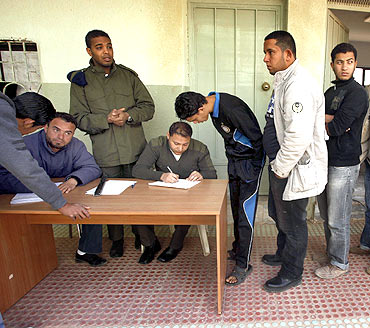
Gaddafi's comments came on a day he unleashed his force of heavily armed mercenaries, who stormed the rebel-held oil exporting terminal town of Brega. Forces loyal to Gaddafi also regained control of the strategic town in the country's north-west. To strike back, opposition fighters are preparing for a march into Tripoli.
Deploying tanks and heavy artillery, Gaddafi sent hundreds of cars packed with mercenaries to storm the rebel-held Brega, as his Russian built warplanes bombed the nearby Ajdabiya, 40 kms from the oil-town.
Though initially Gaddafi's militiamen managed to recapture the town, they were later overwhelmed by a big force of rebels from the adjoining Ajdabiya. The Libyan despot used a lull in fighting to time his offensive to break the momentum of popular rebellion against his 41-year-old rule.
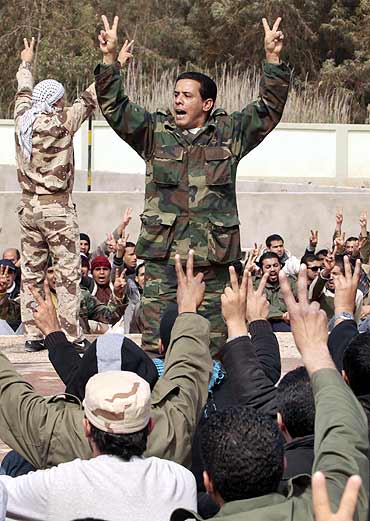
Top United States and North Atlantic Treaty Organisation leaders are mulling over the complexities of enforcing a 'no-fly' zone, which would effectively ground Gaddafi's airpower. The fast paced developments come after the strife-torn nation's newly emerged opposition leaders approached the United Nations to ask for foreign air strikes to pulverise Gaddafi's capabilities to hit civilian targets.
The opposition leaders, based in the rebel-held eastern city of Benghazi, Libya's second largest town, said they wanted to invoke the United Nations, "to pre-empt more massacres by Gaddafi's air force in the coming days as the tide turns against the despot."
Al Jazeera channel reported that forces sent by the Libyan leader captured Marsa al-Brega. "The town fell after intense fighting due to air-bombardment," the Arab channel reported, quoting eyewitnesses. The assaults mark the most significant gains made by Gaddafi's forces, which have been on the retreat.
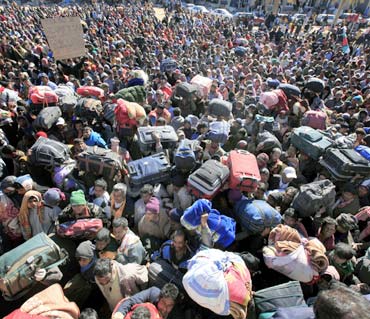
The fresh battles could trigger an intense confrontation which United States Secretary of State Hillary Clinton has warned could descend the Arab nation into a prolonged civil war, unless the dictator was made to step down.
Al-Jazeera reported that towns of Gharyan and Sabratha had also switched sides after intense battles. The opposition leaders said Gaddafi's offensive was aimed at creating a buffer zone around the capital where he is holed up.
An intense battle was also reported to be underway for the control of Misruta, 200 kms east of Tripoli, where rebel forces were reported to be on the periphery of a major air base located on the outskirts of the town.
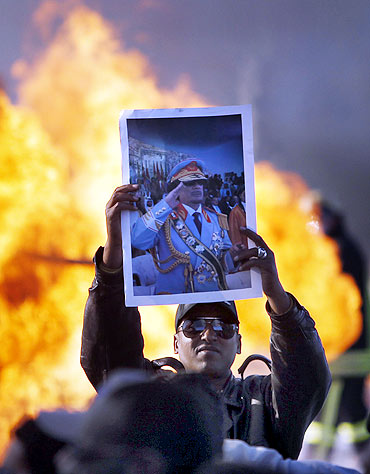
Though Brega changed hands, opposition commanders said they were confident of flushing out the mercenaries as "we are receiving large-scale defections from the Libyan army." They said a rebel force of 10,000 volunteers have gathered at Ajdabiya for a counter attack on Brega.
Three US warships armed with fighters, helicopter gunships and marines have taken up positions off the Libyan coast, but US and NATO commanders kept the world guessing on whether or not they would impose a 'no-fly' zone.
The White House said the ships were being redeployed as part of western efforts to pile more pressure on Gaddafi to stop his violent crackdown and step aside. But a US official stressed it "was not taking any options off the table".
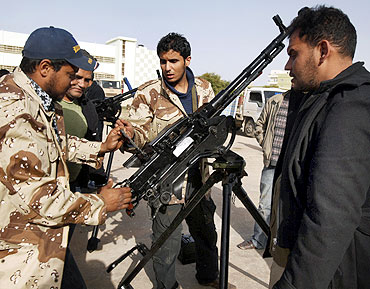
Earlier, Defence Secretary Robert Gates had said, "We are looking at a lot of options and contingencies. No decisions have been made on any course of action."
Though Gates sidestepped a direct question on whether a decision had been taken on enforcing a 'no-fly' zone, Clinton said Libya was at a crossroads, and the stakes were very high.
British Prime Minister David Cameron, a leading advocate of 'no-fly' zone, said, "It was not acceptable to have a situation where Colonel Gaddafi can murder his own people using aeroplanes and helicopters".
Earlier, in a deposition before the US Congress, the head of US Central Command General James Mattis said that enforcing a 'no-fly' zone will first require bombing Libyan radar and missile defence.